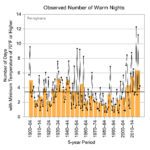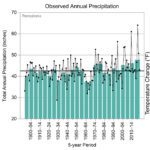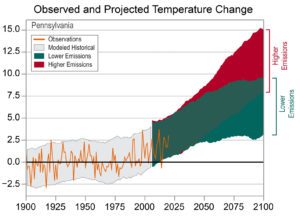Climate Ch ange in Pennsylvania
ange in Pennsylvania
In Pennsylvania, since the start of the 20th century, surface temperatures have increased by 2℉ (mostly in winter and spring) and the number of warm nights and extreme precipitation events have both increased. These warming trends are expected to continue with heat waves becoming more intense and springtime flooding risk increasing.These changes pose a serious threat not just to the City of Easton’s natural resources, but also to our jobs and our health. Climate action also presents huge opportunities for creating a healthier, safer, and more equitable zero-carbon world. The City of Easton has an unparalleled opportunity to make changes in ways that create jobs and benefit all residents.
Climate Change in Pennsylvania
Frankson, R., K.E. Kunkel, S.M. Champion, B.C. Stewart, A.T. DeGaetano, W. Sweet, and J. Spaccio, 2022:
Pennsylvania State Climate Summary 2022. NOAA Technical Report NESDIS 150-PA. NOAA/NESDIS, Silver Spring, MD, 5 pp.
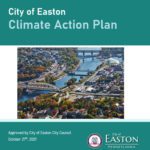 About Easton’s Climate Action
About Easton’s Climate Action
The City of Easton joined the Global Covenant of Mayors for Climate and Energy in 2016, and completed a greenhouse gas inventory in 2016, 2017, 2018, and 2022. A climate vulnerability assessment and an emissions reduction target were developed in spring of 2018. In fall 2020, Nurture Nature Center, on behalf of the City of Easton, participated in the PA DEP Local Climate Action Program, which supported the development of Easton’s Climate Action Plan (CAP) that was adopted by City Council on October 27, 2021. An adaptation plan and a revised CAP and emissions reduction goal (net zero by 2050) were added and adopted in March 2024. The City of Easton is now working to implement strategies in the CAP in order to reach the emissions reduction target goals, including the convening of an Advisory CAP Task Force. Read the CAP here.
How to Get Involved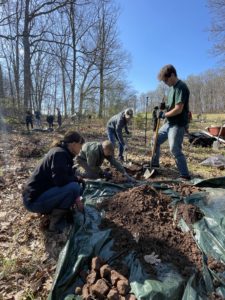
Are you interested in helping Easton reach its sustainability and climate action goals? Everyone can make a difference.
Start by looking at the CAP outline in the website - what strategies are you most interested in and might be able to contribute to? What behaviors or actions do you do at home that you could adjust to reduce emissions? Let us know if you have ideas, comments, or suggestions - reach out to ksemmens@nurturenature.org with your thoughts.
